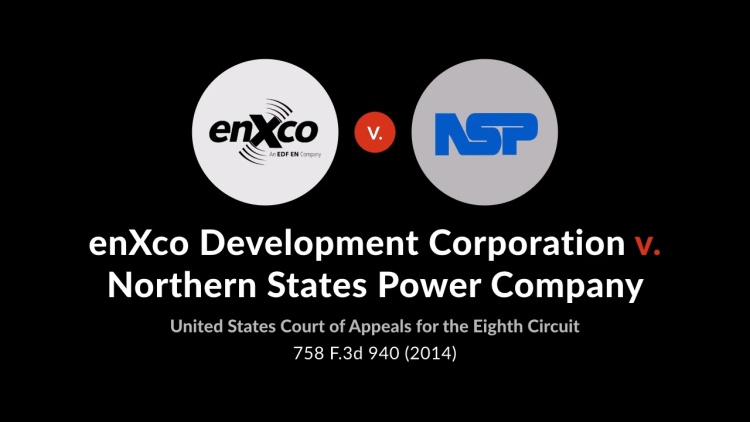enXco Development Corporation v. Northern States Power Company
United States Court of Appeals for the Eighth Circuit
758 F.3d 940 (2014)
- Written by Craig Conway, LLM
Facts
A company named enXco Development Corporation (EnXco) (plaintiff) executed two contracts with Northern States Power Company (NSP) (defendant) to construct a wind-energy project. The parties were required to fulfill the terms of the purchase-and-sale agreement (PSA) before proceeding with the construction agreement. The PSA required EnXco to obtain a Certificate of Site Compatibility (CSC) by a certain date, which was called the Long-Stop date, and included an express termination clause. EnXco failed to obtain the CSC due to temporary delays caused by a severe snowstorm, a government-hearing location error, and state-law notice requirements, despite having 29 months to do so. In response to a declaratory-judgment action that NSP filed for termination of the contracts, EnXco filed suit in federal district court against NSP for breach of contract, seeking declaratory relief and damages. The district court granted NSP’s motion for summary judgment. EnXco did not relinquish, and NSP did not receive, any assets or real property from termination of the contracts. EnXco appealed, arguing that the doctrines of impracticability and disproportionate forfeiture prevented the district court from strictly enforcing the condition precedent requiring EnXco to obtain the CSC.
Rule of Law
Issue
Holding and Reasoning (Smith, J.)
Concurrence (Beam, J.)
What to do next…
Here's why 911,000 law students have relied on our case briefs:
- Written by law professors and practitioners, not other law students. 47,100 briefs, keyed to 997 casebooks. Top-notch customer support.
- The right amount of information, includes the facts, issues, rule of law, holding and reasoning, and any concurrences and dissents.
- Access in your classes, works on your mobile and tablet. Massive library of related video lessons and high quality multiple-choice questions.
- Easy to use, uniform format for every case brief. Written in plain English, not in legalese. Our briefs summarize and simplify; they don’t just repeat the court’s language.





